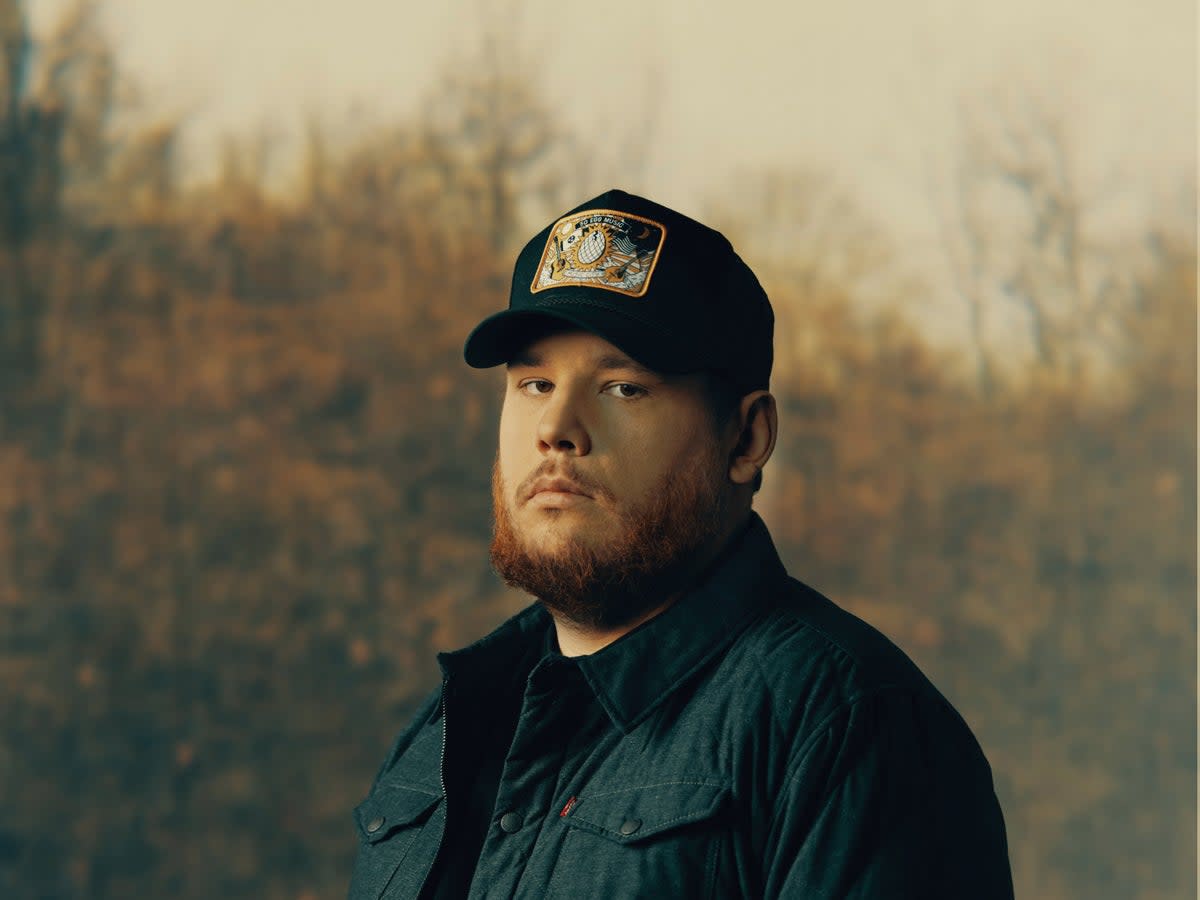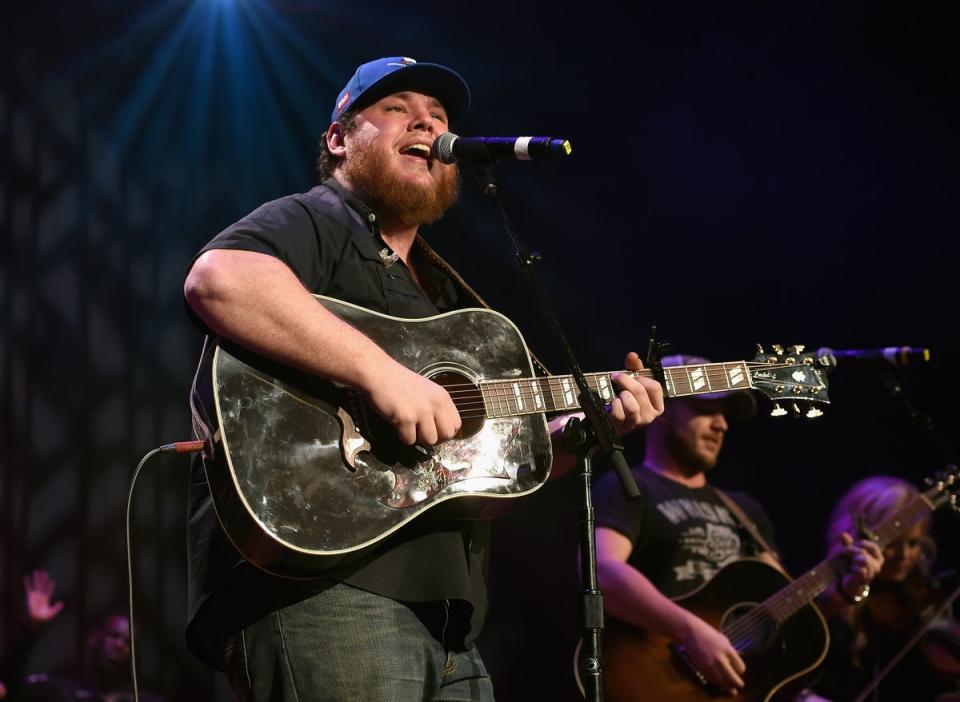Luke Combs: ‘Nobody can even agree to disagree’

- Oops!Something went wrong.Please try again later.
Luke Combs is drinking a beer. It’s around 10am at the country music star’s sprawling, 140-acre property in Tennessee, about an hour’s drive from Nashville. But hey, he’s probably earned it.
In just over five years, Combs has gone from a virtual unknown to one of the biggest names in country. Raised in Asheville, a thriving arts hub overlooked by Carolina’s Blue Ridge mountains, the 32-year-old makes the kind of foot-stomping country – about heartbreak, hangovers and hometowns – that sells out football stadiums in a matter of seconds. His debut single, “Hurricane”, was a lovelorn anthem that introduced his whisky barrel of a voice to America and got him signed to Columbia’s Nashville imprint. It’s been a blur, he says, but so far he’s enjoying the ride.
“I didn’t know that I was going to do something like this,” he tells me over video call from his self-described “man cave”. Behind him, the wall is decorated with framed sports jerseys and platinum records; next door is the home he shares with his wife, Nicole, and their infant son, Tex Lawrence Combs. Before music, Combs thought he could be a detective (“but I just don’t think I was smart enough, you know?”). Then, back home for the summer holidays while at college – bored of working in the local arcade – he found the guitar his parents had bought him when he was around 11 years old. “I picked it up because I didn’t have anything else to do,” he says. “I was having fun with it.”
That Combs still seems so grounded is part of his charm. Until a few years ago, he’d barely ventured further than the next three states. On the day his new album, Growin’ Up, was released, he was out in the yard feeding the chickens like he would any other morning. Look up “Just Your Average Guy” in the dictionary and you’ll probably find a picture of Combs, baseball cap sutured to his head.
“I feel glad that I’ve been able to remain the same person in a lot of ways,” he says in his gruff, matter-of-fact way. “That’s something you have to work at, though, because [success makes] people treat you different. It’s hard, at times. But I’ve just always loved to sing, and I’m lucky to be pretty decent at it.”
It took the industry a while to cotton on to Combs’s down-home appeal. Label execs turfed him out of their offices because he wasn’t the buff, autotuned crooner they were after; he was rejected by The Voice because he lacked any kind of sob story. “My parents had regular gigs – my mum worked at the bank and my dad was a maintenance man,” he says with a shrug. Both his parents loved music, and Combs grew up to the sounds of Tom Petty, John Mellencamp, Led Zeppelin and Garth Brooks.
His own sound swings and swaggers – he has a gift for a hook – but maintains an outlaw grit that keeps him on the right side of commercial. And then there’s his songwriting, closer to that of Chris Stapleton than bro-country overlords Florida Georgia Line. He has a sweet turn of phrase – “I used to wanna hit ’em like Chipper did / But I swung it just a little too slow,” he sings on “Used to Wish I Was” – that catches you off guard amid the Hammond organs and electric guitar solos.
Growin’ Up, his third album, is a career best that tussles playfully between his responsibilities as a new husband and father and his love of a good time. There are defiant singalongs akin to “Beer Never Broke My Heart”, his 2019 hit, in the form of the rollicking “Ain’t Far from It” and “Any Given Friday Night”. Grammy-winning country queen Miranda Lambert joins him for the bittersweet “Outrunning Your Memory”. Perhaps most poignant is “Middle of Somewhere”, on which Combs celebrates the “sweet and slow and simple” way of living that makes him feel most at ease.
“People are just so proud to be from here,” he says. “They’re in this place that most have probably never heard of. Like, when my friends would come out from Nashville to write songs here, they’d be like, ‘Man, he lives in the middle of nowhere.’ And they didn’t mean it in a derogatory sense, but it made me think of the idea. It’s a little ode to this place, which I think has really changed the way I think about a lot of things.” In the past, he’s become frustrated by snobbish attitudes towards the South. “Being Southern, the joke is always that we talk slow, that kinda thing,” he says. It’s the same with country music: “Especially when I was growing up, it was a thing to be like, ‘Oh, I listen to everything but country.’ I never quite understood that.”

In recent years, country music has come under scrutiny amid a fraught political climate, with many artists still flat-out refusing to risk alienating their more conservative fans. Case in point: Taylor Swift, who made the jump from country to pop years ago, still made international headlines when she spoke out against Trump in 2020. In a documentary released that year, she was filmed speaking of her fears of being “like the Dixie Chicks”, who were effectively hounded out of Nashville in 2003 after condemning George W Bush over the Iraq war.
Combs seemed to be aware of this when he insisted his standalone song, 2021’s “The Great Divide”, wasn’t meant to be political. Yet that sparked a fierce reaction from fellow artist Margo Price, who resurfaced photos of Combs with a guitar bearing a Confederate flag sticker, implying he was a hypocrite. He issued an apology shortly after, during a panel with country singer Maren Morris and music critic Ann Powers.
“As a younger man, that was an image that I associated to mean something else,” he said at the time. “As I’ve grown in my time as an artist – and the world has changed drastically in the last five to seven years – I’m now aware how painful that image can be to someone else, no matter what I thought at the time.” Morris said that she had also had to educate herself on why the flag is problematic: “I’m from Texas... but I did not know that the rebel flag meant what it meant until I was probably 15 or 16 years old.”
Today, Combs remains regretful over his use of the flag image, yet also seems a little irked that the song ignited such an ironic row. During his apology last year, he spoke of his belief that “people can change”, but only – he seemed to say – if there is understanding and patience on both sides. “Everything is so contentious and heated, and that’s always been super frustrating to me,” he says now. “I think what makes our country great is people’s ability to have their own opinions and have the ability to disagree. Right now, everyone is just so hot about everything. And that adds to the tension that was going on.”
For him and his co-writer, Grammy-winning bluegrass musician Billy Strings, the song spoke to a moment in America where it seems “nobody can even agree to disagree”. Accompanied by warm, intricate picking on the acoustic guitar, banjo and mandolin, Combs sings: “We’re striking matches on the TV / Setting fires on our phones / Bearing crosses we believe in dying on.” It called out a climate where everyone seems compelled to have the strongest opinion, the last word, when sometimes it might be better to just listen. “It definitely upset some folks,” he says of the reaction to the song. “But it is what it is. I’ve never been afraid to stand up for what I think is right.”
‘Growin’ Up’ is out now

